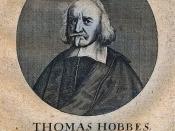Thomas Hobbes was the philosopher who supported the ideas of legal positivism that untangled morality from law. The divine right is a tool in which the government used to exercise power over the masses with an eternal threat of death. He wasn't really a believer in God, he believed in natural law but deviates from the idea by leading to ordinary conclusions. One of those ordinary conclusions he discusses in his book entitled The Leviathan was that a man's ultimate concern should be the preservation of his own life. He still recognized "moral obligations" to keep one's promises even if the fulfillment of those obligations is very likely going to cost the individual his life. In other words, he recognizes that there are more important human goals than just staying alive.
Thomas Hobbes presents his essay by saying any state is better than no state, unless the state is trying to take one's rights.
Thomas Hobbes states, "For as to the strength of body, the weakest has strength enough to kill the strongest by secret machination, or by confederacy with other, that are in the same danger with himself". This idea corresponds with that of Darwin's notion of survival of the fittest.
The theory of survival of the fittest surrounds one element that is the element of competition. He stated that in a state, there exists situations like competition. Hobbes further states that if any two men desire the same thing, both men will go as far as they have to in order to satisfy their wants, even if the final resolution results in the loss of a friendship.
In a previous statement, Hobbes proceeds to say that competition exists in the state of nature but self-defense also results in a problem. He writes, "let him therefore consider with himself,


